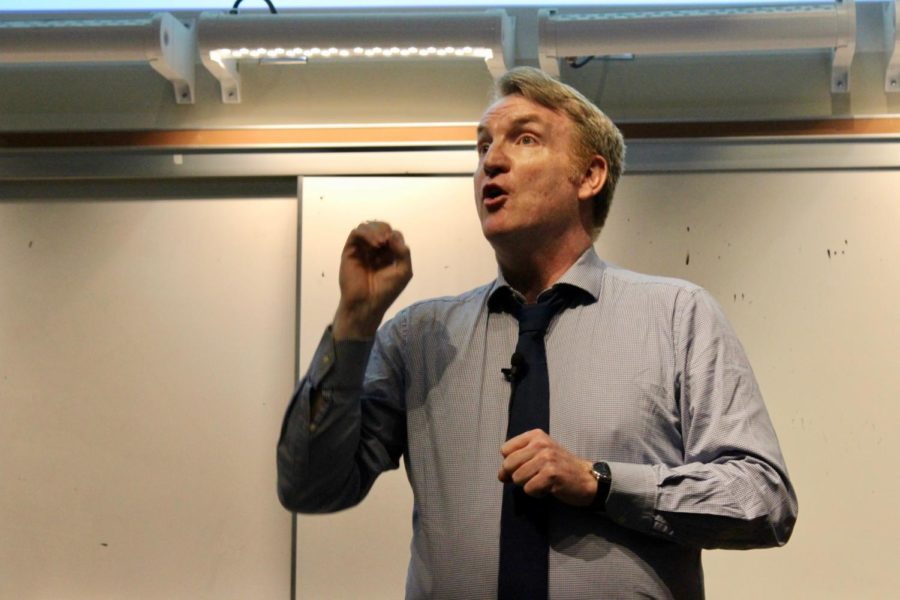Guest lecturer speaks on geopolitics, economics of Southern Africa
Samantha Vaith/Iowa State Daily
Páidrig Carmody works at Trinity College located in Dublin and is the editor for “Geoforum”. He flew from Dublin to lecture about how geography and economics mix April 10.
April 10, 2017
Students and faculty members gathered in the Kocimski Auditorium on Monday evening to hear Padraig Carmody, professor at the Trinity College of Dublin, discuss the impact various countries have on South African economies and resources.
The lecture, titled “The Geopolitics and Economics of BRICS Resource and Market Access in Southern Africa: The Zambian Case,” reflects on the significance that Brazil, Russia, India, China and South Africa (BRICS) have on African states’ developmental policy, practice and outcome, according to a lecture press release.
Carmody conducts research that centers around the political economy of globalization in Africa, according to a biography on the Trinity College of Dublin faculty page.
The talk began with some figures that Carmody used to explain how big of an impact BRICS has on the world as a whole.
“BRICS makes up over 40 percent of the global population and nearly 30 percent of the world’s land area,” Carmody said. “They made up over 55 percent of the world economic growth from the period of 2000-2008.”
But many may be unfamiliar with the term BRICS and what the conglomerate hopes to accomplish on the global scale.
Carmody discussed the relevance of BRICS and how the countries can help merge the power of the West and other countries from around the world to aid.
“It is a process resulting in the evolution of BRICS as a concept … to reshape global balance,” he said.
BRICS, Carmody said, should be used as a lens to reflect on the changing nature of globalization.
Carmody also discussed the kind of benefits that BRICS can bring to the table in Africa. The purpose of BRICS is not to enforce a certain way of life in African countries but instead to help reduce poverty rates while helping to boost economic and social development in certain states.
BRICS in general works as a whole, however, there is one country among the group that contributes more than the others.
“China makes up for 60 percent of the total economic output of BRICS,” Carmody said. “They offer different power capabilities from other BRICS countries when combined. They are arguably the biggest economy in the world: the potential of foreign exchange reserves, their state-owned corporations and their affiliation with the U.N.”
According to the Indian Consul General, “South Africa is the ‘country that matters in Africa.’”
Carmody said this was due to South Africa being included in the BRICS geopositionality.
In Zambia, a regional commodity and trade economy are being created, which reinforces dependence, Carmody said.
“I can see BRICS gaining traction in the West,” Carmody said. “And definitely making a big impact on other countries of the world.”







